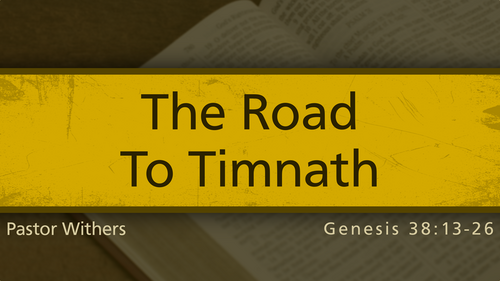The Road to Timnath

Life's journey is often paved with unexpected twists and turns, moments of pain, and choices we later regret. But what if these very experiences - the ones that leave us feeling broken and unworthy - are the stepping stones to our redemption?
The story of Judah and Tamar from Genesis 38 offers a powerful illustration of this truth. At first glance, their tale seems to be one of deception, tragedy, and moral failure. But looking deeper, we find a narrative of broken people stumbling towards redemption, and a God who specializes in turning our messes into miracles.
Judah, one of the twelve sons of Jacob, made the questionable decision to marry a Canaanite woman, Bethshua. This union, between a man of faith and a woman who worshipped pagan gods, set the stage for familial discord and spiritual confusion. Their children, raised in this divided household, grew to be wicked men.
Enter Tamar, a young Canaanite woman betrothed to Judah's eldest son, Er. From the outset, she faced abuse and mistreatment. When God struck down Er for his wickedness, custom dictated that the next brother, Onan, should marry Tamar and provide an heir. But Onan, too, treated Tamar unjustly and met a similar fate.
Judah, fearing for his youngest son Shelah, sent Tamar back to her father's house with a hollow promise of future marriage. Years passed, and Tamar realized the promise would never be fulfilled. Desperate for a child and a secure future, she resorted to deception, disguising herself as a prostitute to trick Judah into sleeping with her.
It's easy to judge both Judah and Tamar for their actions. But their story invites us to look beyond the surface and consider the brokenness that led them to this point. Judah, emotionally abused by his wife and grieving the loss of two sons, was a man carrying deep wounds. Tamar, twice widowed and facing a future without hope or security, was driven to desperate measures.
Their encounter on the road to Timnath was born of pain, fear, and broken dreams. Yet it was precisely at this low point that God's redemptive work began to unfold.
This narrative challenges us to reconsider how we view our own failures and those of others. It's a poignant reminder that God sees beyond our mistakes to the hurt and brokenness that often drive our poor choices. As Isaiah 54:17 declares, "No weapon formed against you shall prosper." The weapons formed against us - whether through our own actions or the actions of others - do not have the final say in our story.
The road to Timnath, like many of life's journeys, was paved with obscurity. Had Judah and Tamar known what lay ahead, they might never have taken those steps. How often do we find ourselves on similar paths, questioning if God could possibly be present in our messy circumstances?
Yet it's precisely in these moments of uncertainty and apparent failure that God's redemptive power shines brightest. Romans 8:28 assures us that "all things work together for good to those who love God, to those who are called according to His purpose." This doesn't mean God ordains our mistakes or sins, but rather that He has the power to weave even our darkest moments into His tapestry of redemption.
Consider the metaphor of Tamar's name, which means "date palm." This tree thrives in the harshest desert conditions, producing sweet fruit despite intense heat. Similarly, God can bring forth beauty and purpose from the most challenging circumstances of our lives.
The story of Judah and Tamar culminates in an unexpected twist. Their encounter, born of deception and desperation, becomes part of the lineage of Jesus Christ. God took what seemed irredeemable and made it a crucial link in His plan of salvation for all humanity.
This powerful example reminds us that no one is beyond the reach of God's grace. Many of us carry the weight of past mistakes, believing we're unworthy of God's love or unable to be used for His purposes. But if God could redeem the messy story of Judah and Tamar, weaving it into the very genealogy of the Messiah, how much more can He redeem our stories?
God is in the business of redemption. He specializes in taking our brokenness and creating something beautiful. As the prophet Isaiah declared, "Though your sins are like scarlet, they shall be as white as snow" (Isaiah 1:18). God's mercy is not limited by our past; it's activated by our repentance and willingness to turn to Him.
The road to Timnath teaches us that our darkest moments don't define us. Instead, they can become the very places where we encounter God's transformative grace. It's a call to reframe our perspective on failure and brokenness, seeing them not as endpoints but as potential starting points for God's redemptive work.
This truth extends beyond our individual lives to our relationships with others. How often do we write people off because of their mistakes or judge them based on their worst moments? The story of Judah and Tamar challenges us to look deeper, to consider the road that led someone to their current situation, and to extend the same grace and mercy that God so freely gives us.
As we reflect on this ancient tale, let's allow its truths to penetrate our hearts. Are there areas of your life where you feel beyond redemption? Places of failure or brokenness that you believe are too far gone for God to use? Take heart in knowing that these very places can become the soil in which God plants seeds of redemption.
Remember, in God's economy, nothing is wasted. Every experience, every mistake, every moment of pain has the potential to be transformed into something beautiful. Our job is not to be perfect, but to be willing - willing to bring our brokenness to God, willing to receive His forgiveness, and willing to believe that He can make all things new.
As you navigate your own road to Timnath, whatever that may look like, hold fast to the promise that God is with you. He sees beyond your current circumstances to the person you are becoming. And He is ever at work, weaving together the threads of your life into a tapestry of grace, redemption, and hope.
